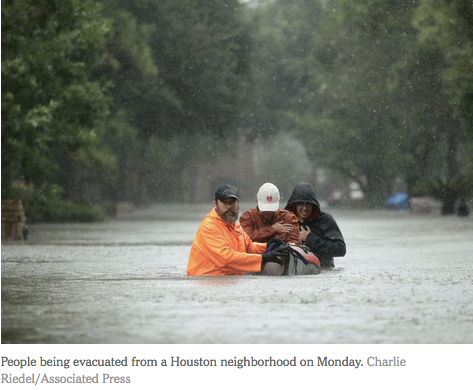There are lessons to be learned, as there always are after disasters like this. Some of those lessons — like how unchecked urban sprawl and paving over of wetlands and prairies have increased the risk posed by floods in Houston and other cities — were evident long before Harvey and ought to become more urgent in the storm’s wake. Experts will also point out, as they have before, that cities ought to abandon traditional flood-control approaches that were never very good and are wholly inadequate for dealing with the kinds of intense storms that have become more frequent in recent years. Instead, they need to adopt smarter strategies that provide more space for floodwaters to seep into the ground and drain away slowly without leaving behind a trail of destruction.
There may also be a message here for President Trump. Although it’s expecting a lot of someone who calls global warming a hoax, he might pause to reflect on the possible connections between climate change and extreme weather events like this one. Climate scientists resist drawing a link between climate change and any particular event. But warming can make a bad situation worse. Rising temperatures warm the oceans, causing more evaporation, more moisture in the atmosphere and heavier rainfall. Warmer oceans also provide added fuel for storms like Harvey, making them bigger and more intense.
The Storm That Humans Helped Cause
Even before the devastation from Harvey, southeastern Texas was enduring a year unlike any before.
The daily surface temperature of the Gulf of Mexico last winter never dropped below 73 degrees. You can probably guess how many previous times that had happened: Zero.
This sort of heat has a specific effect on storms: Warmer weather causes heavier rainfall. Why? When the seas warm, more moisture evaporates into the air, and when the air warms — which has also been happening in Texas — it can carry more moisture.
The severity of Harvey, in other words, is almost certainly related to climate change.
Yes, I know the sober warning that’s issued whenever an extreme weather disaster occurs: No individual storm can be definitively blamed on climate change. It’s true, too. Some version of Harvey probably would have happened without climate change, and we’ll never know the hypothetical truth.
But it’s time to shed some of the fussy over-precision about the relationship between climate change and weather. James Hansen, the eminent climate researcher, has used the term “scientific reticence” to describe this problem. Out of an abundance of academic caution — a caution that is in many ways admirable — scientists (and journalists) have obscured climate change’s true effects.




